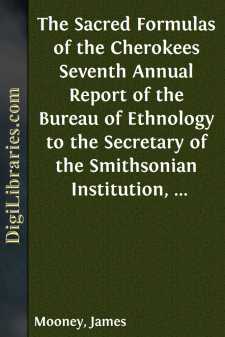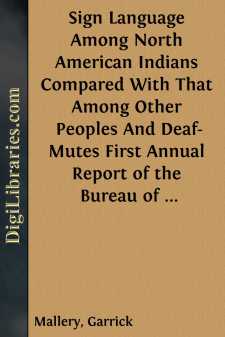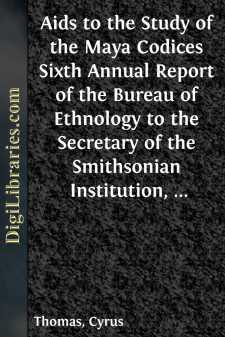Language Arts & Disciplines
- Alphabet 2
- Authorship 5
- Composition & Creative Writing 2
- Etymology 4
- General
- Grammar 18
- Journalism 3
- Phonetics & Phonics 1
- Public Speaking 1
- Publishing 1
- Readers 2
- Reading Skills 1
- Rhetoric 8
- Semantics 1
- Spelling 2
- Study & Teaching 3
- Translating & Interpreting 2
- Vocabulary 5
General Books
Sort by:
by:
James Mooney
INTRODUCTION. The sacred formulas here given are selected from a collection of about six hundred, obtained on the Cherokee reservation in North Carolina in 1887 and 1888, and covering every subject pertaining to the daily life and thought of the Indian, including medicine, love, hunting, fishing, war, self-protection, destruction of enemies, witchcraft, the crops, the council, the ball play, etc., and,...
more...
CHAPTER I. THE COLONIES. HISTORY AND LOCATION. THE FIRST SETTLERS. The first reference to German settlers in Brazil we have from the pen of Hans Stade of Homberg in Hessen. Stade made two trips to Brazil; one in 1547 and one in 1549. In the latter instance he was shipwrecked but succeeded in landing safely near the present port of Santos in the state of São Paulo. As he was a skilled artillerist the...
more...
by:
Horatio Hale
CHAPTER I. THE HURON-IROQUOIS NATIONS. At the outset of the sixteenth century, when the five tribes or"nations" of the Iroquois confederacy first became known to Europeanexplorers, they were found occupying the valleys and uplands of northernNew York, in that picturesque and fruitful region which stretcheswestward from the head-waters of the Hudson to the Genesee. The Mohawks,or Caniengas—as...
more...
by:
Edwin Waugh
I came out at Haslingden town-end with my old acquaintance, "Rondle o'th Nab," better known by the name of "Sceawter," a moor-end farmer and cattle dealer. He was telling me a story about a cat that squinted, and grew very fat because—to use his own words—it "catched two mice at one go." When he had finished the tale, he stopped suddenly in the middle of the road, and...
more...
CHAPTER I. INTRODUCTORY. The Rommany of the Roads.—The Secret of Vagabond Life in England.—Its peculiar and thoroughly hidden Nature.—Gipsy Character and the Causes which formed it.—Moral Results of hungry Marauding.—Gipsy ideas of Religion. The Scripture story of the Seven Whistlers.—The Baker’s Daughter.—Difficulties of acquiring Rommany.—The Fable of the Cat.—The Chinese, the...
more...
by:
Garrick Mallery
INTRODUCTORY. During the past two years the present writer has devoted the intervals between official duties to collecting and collating materials for the study of sign language. As the few publications on the general subject, possessing more than historic interest, are meager in details and vague in expression, original investigation has been necessary. The high development of communication by gesture...
more...
INTRODUCTION. The following paper from the pen of Dr. Prior was read at a Conversazione of the Society at Taunton, in the winter of 1871, and as it treats the subject from a more general point of view than is usually taken of it, we print it with his permission as an introduction to our vocabulary:— On the Somerset Dialects. The two gentlemen who have undertaken to compile a glossary of the Somerset...
more...
by:
Cyrus Thomas
INTRODUCTION. The object of this paper is to present to students of American paleography a brief explanation of some discoveries, made in regard to certain Maya codices, which are not mentioned in my previous papers relating to these aboriginal manuscripts. It is apparent to every one who has carefully studied these manuscripts that any attempt to decipher them on the supposition that they contain true...
more...
by:
John Hartley
Or the Cottage on the Hill. A Christmas Story. CHAPTER I. The last strain of the grand old Christmas hymn had just been warbled forth from the throats and hearts of a number of happy folks, who were seated around the blazing log one Christmas eve; and on the face of each one of that family circle the cheering light revealed the look of happiness; the young—happy in the present, and indulging in...
more...
by:
Alfred Ayres
PREFATORY NOTE. The title-page sufficiently sets forth the end this little book is intended to serve. For convenience' sake I have arranged in alphabetical order the subjects treated of, and for economy's sake I have kept in mind that "he that uses many words for the explaining of any subject doth, like the cuttle-fish, hide himself in his own ink." The curious inquirer who sets...
more...











